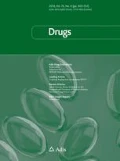Abstract
Evolocumab (Repatha™) is a fully human monoclonal antibody developed by Amgen that has been approved as a treatment for hypercholesterolaemia in the EU, and is awaiting approval in the USA and Japan. It specifically binds proprotein convertase subtilisin/kexin type 9 (PCSK9)—a negative regulator of low-density lipoprotein (LDL)-receptors—thereby improving the ability of the liver to bind LDL-cholesterol (LDL-C), leading to reduced LDL-C blood levels. The drug reduces LDL-C levels in patients with hypercholesterolaemia when used as monotherapy or in conjunction with a statin. This article summarizes the milestones in the development of evolocumab leading to this approval for the treatment of adults with primary hypercholesterolaemia (heterozygous familial and non-familial) or mixed dyslipidaemia as an adjunct to diet with or without a statin and/or other lipid lowering therapies, and in adults and adolescents aged ≥12 years with homozygous familial hypercholesterolaemia in combination with other lipid lowering therapies.
Similar content being viewed by others
References
European Medicines Agency. Repatha (evolocumab): EU summary of product characteristics. 2014. http://www.ema.europa.eu/docs/en_GB/document_library/EPAR_-_Product_Information/human/003766/WC500191398.pdf. Accessed 4 Aug 2015.
Amgen, Astellas Pharma. Amgen and Astellas announce Japan alliance [media release]. 29 May 2013. http://www.amgen.com.
Dias CS, Shaywitz AJ, Wasserman SM, et al. Effects of AMG 145 on low-density lipoprotein cholesterol levels: results from 2 randomized, double-blind, placebo-controlled, ascending-dose phase 1 studies in healthy volunteers and hypercholesterolemic subjects on statins. J Am Coll Cardiol. 2012;60(19):1888–98.
Emery MG, Gibbs JP, Slatter JG, et al. Evolocumab pharmacokinetics and its effects on LDL-C and PCSK9 lowering in subjects with mild or moderate hepatic impairment [abstract no. PII-034]. Clin Pharmacol Ther. 2015;97:S69.
Gibbs JP, Grover A, Emery MG, et al. Impact of target-mediated elimination on evolocumab dose and regimen [abstract no. 422]. In: European Atherosclerosis Society Annual Congress 2015. 2015.
Wasserman SM, Koren MJ, Giugliano RP, et al. Evaluation of the relationship between evolocumab 140 mg every two weeks and 420 mg monthly dosing regimens [abstract no. 16270]. Circulation. 2014;130(Suppl 2):A16270.
Stein EA, Koren M, Honarpour N, et al. Clinical equivalence of evolocumab 140 mg every two weeks and 420 mg monthly dosing regimens: a pooled analysis of 3146 patients in phase 3 studies. J Am Coll Cardiol. 2015;65(10):A1368.
Blom DJ, Hala T, Bolognese M, et al. A 52-week placebo-controlled trial of evolocumab in hyperlipidemia. N Engl J Med. 2014;370(19):1809–19.
Robinson JG, Nedergaard BS, Rogers WJ, et al. Effect of evolocumab or ezetimibe added to moderate- or high-intensity statin therapy on LDL-C lowering in patients with hypercholesterolemia: the LAPLACE-2 randomized clinical trial. JAMA. 2014;311(18):1870–82.
Kiyosue A, Honarpour N, Xue A, et al. Effects of evolocumab (AMG 145) in hypercholesterolemic, statin-treated, Japanese patients at high cardiovascular risk: Results from the phase III yukawa 2 study. J Am Coll Cardiol. 2015;65(10):A1369.
Giugliano RP, Desai NR, Kohli P, et al. Efficacy, safety, and tolerability of a monoclonal antibody to proprotein convertase subtilisin/kexin type 9 in combination with a statin in patients with hypercholesterolaemia (LAPLACE-TIMI 57): a randomised, placebo-controlled, dose-ranging, phase 2 study. Lancet. 2012;380(9858):2007–17.
Stroes E, Colquhoun D, Sullivan D, et al. Anti-PCSK9 antibody effectively lowers cholesterol in patients with statin intolerance: the GAUSS-2 randomized, placebo-controlled phase 3 clinical trial of evolocumab. J Am Coll Cardiol. 2014;63(23):2541–8.
Sullivan D, Olsson AG, Scott R, et al. Effect of a monoclonal antibody to PCSK9 on low-density lipoprotein cholesterol levels in statin-intolerant patients: the GAUSS randomized trial. JAMA. 2012;308(23):2497–506.
Koren MJ, Lundqvist P, Bolognese M, et al. Anti-PCSK9 monotherapy for hypercholesterolemia: the MENDEL-2 randomized, controlled phase III clinical trial of evolocumab. J Am Coll Cardiol. 2014;63(23):2531–40.
Koren MJ, Scott R, Kim JB, et al. Efficacy, safety, and tolerability of a monoclonal antibody to proprotein convertase subtilisin/kexin type 9 as monotherapy in patients with hypercholesterolaemia (MENDEL): a randomised, double-blind, placebo-controlled, phase 2 study. Lancet. 2012;380(9858):1995–2006.
Raal FJ, Stein EA, Dufour R, et al. PCSK9 inhibition with evolocumab (AMG 145) in heterozygous familial hypercholesterolaemia (RUTHERFORD-2): a randomised, double-blind, placebo-controlled trial. Lancet. 2015;385(9965):331–40.
Raal FJ, Honarpour N, Blom DJ, et al. Inhibition of PCSK9 with evolocumab in homozygous familial hypercholesterolaemia (TESLA Part B): a randomised, double-blind, placebo-controlled trial. Lancet. 2015;385(9965):341–50.
Raal F, Hovingh K, Blom D, et al. Long-term treatment with evolocumab in patients with homozygous familial hypercholesterolaemia (HoFH): interim results from the trial assessing long-term use of PCSK9 inhibition in subjects with genetic LDL disorders (TAUSSIG) study [abstract no. 1042]. In: 17th International Symposium on Atherosclerosis. 2015.
Raal F, Scott R, Somaratne R, et al. Low-density lipoprotein cholesterol-lowering effects of AMG 145, a monoclonal antibody to proprotein convertase subtilisin/kexin type 9 serine protease in patients with heterozygous familial hypercholesterolemia: the Reduction of LDL-C with PCSK9 Inhibition in Heterozygous Familial Hypercholesterolemia Disorder (RUTHERFORD) randomized trial. Circulation. 2012;126(20):2408–17.
Stein EA, Honarpour N, Wasserman SM, et al. Effect of the proprotein convertase subtilisin/kexin 9 monoclonal antibody, AMG 145, in homozygous familial hypercholesterolemia. Circulation. 2013;128(19):2113–20.
Toth PP, Sattar N, Genest J, et al. A comprehensive safety analysis of 6026 patients from phase 2 and 3 short and long term clinical trials with evolocumab (AMG 145). J Am Coll Cardiol. 2015;65(10):A1351.
Disclosure
The preparation of this review was not supported by any external funding. During the peer review process the manufacturer of the agent under review was offered an opportunity to comment on the article. Changes resulting from any comments received were made by the authors on the basis of scientific completeness and accuracy. A. Markham is a contracted employee of Adis, Springer SBM.
Author information
Authors and Affiliations
Corresponding author
Additional information
This profile has been extracted and modified from the AdisInsight database. AdisInsight tracks drug development worldwide through the entire development process, from discovery, through pre-clinical and clinical studies to market launch and beyond.
Rights and permissions
About this article
Cite this article
Markham, A. Evolocumab: First Global Approval. Drugs 75, 1567–1573 (2015). https://doi.org/10.1007/s40265-015-0460-4
Published:
Issue Date:
DOI: https://doi.org/10.1007/s40265-015-0460-4



